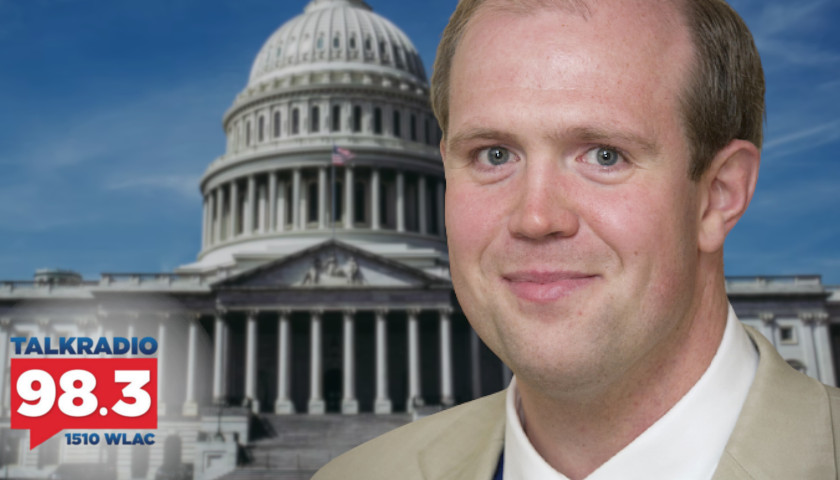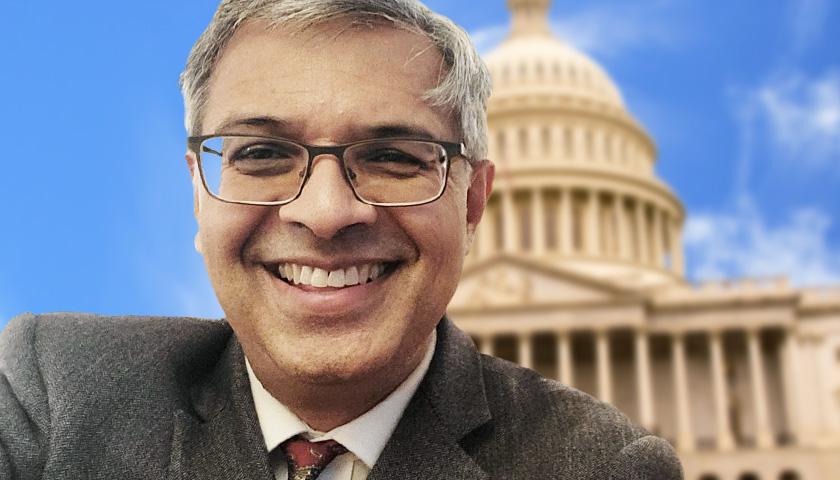Live from Music Row Wednesday morning on The Tennessee Star Report with Michael Patrick Leahy – broadcast on Nashville’s Talk Radio 98.3 and 1510 WLAC weekdays from 5:00 a.m. to 8:00 a.m. – host Leahy welcomed Kalev Leetaru to the newsmaker line who is an American internet entrepreneur, academic, and senior fellow at the George Washington University School of Engineering and Applied Science Center for Cyber & Homeland Security in Washington, D.C. to discuss Section 230 and the First Amendment.
Leahy: We welcome to our newsmaker line, Kalev Leetaru, who is a Real Clear Media fellow and an expert on all things Internet news coverage, fact-checking, and social media platforms. Welcome, Kalev.
Leetaru: Thanks so much for having me.
Leahy: People probably have not heard of you. But I’ve read a lot about what you’ve done. You’ve got some great articles up at Real Clear Politics. One, in particular, caught my attention.
Section 230 of the Communications Act, I guess, is what the law was. How is that being covered on television news? Tell us about what Section 230 does and how it’s being covered accurately or inaccurately.
Leetaru: Section 230, the quote was that’s basically the law that created the Internet. So this is that law that basically says that social media companies can censor at will without consequence. But they can also choose not to censor at will.
Essentially, it says, look, they can choose what we can see and say on the Internet. And there’s nothing that we, as a citizenry can do about it. There are no legal consequences.
There’s no ability for Congress to influence that, et cetera. And what’s interesting is, over the past decade again, this law goes back to the 90s, and is what really gave us the internet.
We’re not really seeing a lot of coverage of that. People don’t really talk about it until this year, for the most part, with the banning of Donald Trump earlier this year.
And on through kind of this very aggressive push now on social media to lay out the new, if you will, rules for what we’re allowed to talk about as a society.
Leahy: Where’s the First Amendment in all this, Kalev?
Leetaru: That’s what makes it so fascinating. The First Amendment only applies to the government. It only says the government is not allowed to restrict what we say. Private companies in this country have always been allowed to do this.
If you look back, Section 230 exists and you look back over our nation’s history all the way back to our founding, we’ve always wrestled with this question of what should people be allowed to say?
We’ve tried it every way. The government has set rules. Private companies of course. We’ve tried it every which way until the Supreme Court eventually said, it’s an intractable problem.
And then the 90s, we gave up as a society and said, look, we can’t figure this out. Democracy has failed to come to a consensus. We’re just going to let private companies decide what’s good for us.
Leahy: But here’s the thing. Doesn’t Section 230 make these social media giants, Facebook, Google, et cetera, agents of the federal government?
Leetaru: That’s what’s so interesting here is in the radio, in the broadcast era, radio stations, got their licenses from the federal government. And there are multiple, many situations throughout history where the government has reminded them that if they say the wrong thing, that license could potentially disappear.
Section 230, though it doesn’t have any of these, it was specifically designed to have no accountability of any kind. It says companies can choose whatever they do, whatever they decide to delete or not delete.
There’s no requirement to be transparent, so they don’t even have to publish the rules under which they censored. They’re not even required to put those out there. There’s no requirement that when they ban you, that they have to even explain why they banned you.
Under Section 230, they should just say, we don’t like you. You’re gone from the Internet, and that’s it. Essentially, there’s no requirement for transparency. And I think that’s the key thing that’s been missing from all this is the fact that literally, the government said, we don’t want anything to do with this.
Even the states do not have any ability to override this. So laws in Florida and elsewhere will have no impact because Section 230 specifically says the states have no authority here.
Leahy: Kalev, you’ve written a report through the Real Clear Foundation entitled Transparency is the First Step Towards Addressing Social Media Censorship. Do you have recommendations in that report as to how we fix this problem?
Leetaru: If you look at Congress today, there are so many different approaches to try to fix it. There’s sort of unanimous agreement that there’s a problem, and I liken it, to the patient’s on the table, we all know the patient is sick.
We all know something has to happen with social media. The problem is right now we don’t know what the patient is suffering from. We know it has a lot of problems, but you can’t start prescribing fixes until you know what the problem is.
And so here in Congress, there are so many. Do we break up the companies? Well, that probably won’t help, because when Donald Trump was banned, TikTok, a Chinese company also banned him.
So even if you split up these companies, if we look back to our history in the broadcast era, companies, competitors all work together. There are questions that should we strengthen Section 230, should we remove Section 230?
Every one of these has consequences. And so my argument is I think that there’s bipartisan recognition that we do something. So my argument is the first step is we need to look inside these companies.
Look at all the revelations that have been coming out the last few weeks. We as a society, this is how we talk to our elected officials now, and they talk back to us.
We need to see inside these companies so that we, as a society can have some say about, gee, we need to fix this.
Leahy: You also report here about how the news media CNN, MSNBC, and Fox News are covering Section 230 issues. Tell us about what you’ve discovered there.
Leetaru: In the past decade, I look back over the last 10 years, you’re not seeing much media coverage of Section 230. It’s sort of that invisible law that’s there that we don’t talk about. In the last year or so and it’s really the last X number of months that we’re finally starting to see a little bit of discussion about it.
And it’s interesting because if you look at topics like Section 230, the First Amendment, and free speech with CNN, MSNBC, and Fox News, it’s Fox News who is talking about all these topics.
And it’s really interesting because if you look across those three channels over the past decade, Fox News has really emerged as the one that talks the most about issues, everything from free speech, the First Amendment, in real life free speech, First Amendment, the digital space.
What does it mean to have the ability to express ourselves and where we think as a society that we should go. Section 230 is the bedrock that makes the internet work that allows these companies to do what they do.
But as a society, most people don’t even know it exists or what it does or the fact that today most people don’t realize the First Amendment does not apply online.
Leahy: Let me ask you a question about the public attitudes towards this. Have there been any polls out on public attitudes towards what we should do with Section 230 and the Internet?
Leetaru: So this is what’s interesting. Freedom of speech is a really interesting thing. If we look back through time like today, you see a lot of these polls where people say Section 230, all these rules we need to have. It’s really interesting to look at the polls today.
People say, look, free speech is absolutely required. We should have no exceptions. It should be a sacrament. But then when the pollster asks about specific things, well, should people be allowed to talk about this? Well, what about this?
Suddenly now you see, people say, oh, well, not that or not that or not that. And it turns out this is nothing new. Look at the 1950s and look before that. If you look back through at least the last century or so, you’ve seen the same thing.
You’ve seen the polls where people say free speech should be absolute, except. And then you see all these exceptions here. This idea that we need these sort of restrictions is nothing new. But what is interesting today is the fact that rewind the clock 100 years.
We had a vibrant local news system in this country. So even if the big national media didn’t talk about something your small town paper take would. Take inflation. Another piece I’ve done shows that it’s really Fox News talking about inflation.
Up to now, you’ve seen almost nothing on CNN and MSNBC. And again, that reflects the different communities that watch the show. Inflation is something that’s real for a lot of people. For other communities, it’s something that’s a conspiracy theory.
Leahy: The numbers show that inflation is up under the Biden maladministration,
Leetaru: And that’s the issue. If all you’re watching day in and day out is CNN, MSNBC, at least I haven’t looked at in the last 30 days, but at least up until a month ago if you saw inflation, it was, oh, yeah, it’s not real. It’s not real. It’s a conspiracy theory.
And this is what I think so fascinating is that the media that we consume gives us not just political issues, but basic facts like inflation are so different across the medium.
This is one of the challenges. If you are someone for like an ordinary one of us, you’re not one of the one-percenters, inflation is very real.
Every time you go to the grocery store, there’s a problem. The fact is we have these parallel universes here.
Leahy: Kalev Leetaru, thanks for joining us this morning. Come back again soon, please.
Listen to the second hour here:
– – –
Tune in weekdays from 5:00 – 8:00 a.m. to the Tennessee Star Report with Michael Patrick Leahy on Talk Radio 98.3 FM WLAC 1510. Listen online at iHeart Radio.
Photo “Kalev Leetaru” by Kalev Leetaru.





